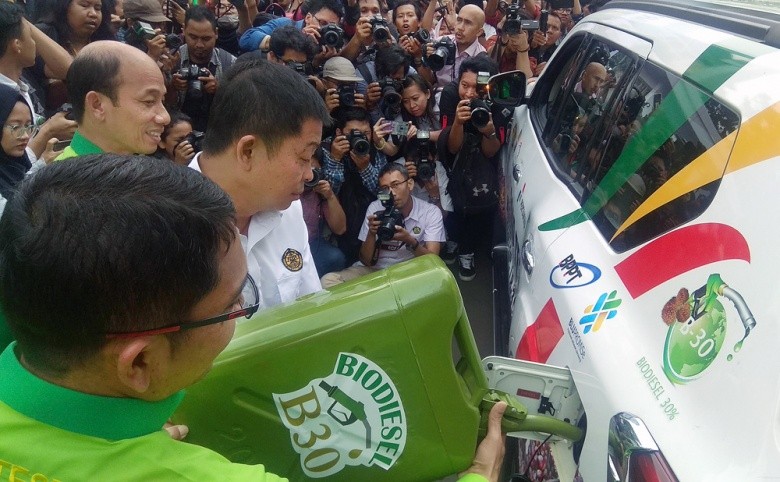Popular Reads
Top Results
Can't find what you're looking for?
View all search resultsPopular Reads
Top Results
Can't find what you're looking for?
View all search resultsBiofuel prospects, challenges
The program certainly should be greatly welcomed as it will reduce fossil fuel consumption, cut oil imports that last year cost US$30 billion and support the country’s campaign to reduce its greenhouse gas emissions by 26 percent by 2030.
Change text size
Gift Premium Articles
to Anyone
A
pparently buoyed by significant progress in the mandatory use of B20 biodiesel (a fuel mixture of 20 percent palm oil and 80 percent petroleum), the Indonesian government has set itself ambitious targets to launch B30 next year and B50 in 2021.
The program certainly should be greatly welcomed as it will reduce fossil fuel consumption, cut oil imports that last year cost US$30 billion and support the country’s campaign to reduce its greenhouse gas emissions by 26 percent by 2030.
Moreover, as the world’s largest palm oil producer with an output of more than 50 million tons last year, the significant increase in the use of palm oil in biodiesel will make the commodity less vulnerable to price volatility in the international market and to trade protectionist measures in Europe and the United States.
Yet more beneficial to the economy is that palm oil cultivation is labor-intensive and involves more than 2 million smallholders. This commodity is also widely used as an ingredient in consumer products. Palm oil refineries in Sumatra, Kalimantan and Sulawesi have increasingly been used for biogas-fired power generation.
The government’s biggest challenge, though, is to ensure that the program, which will surely require a significant increase in palm oil production, will not cause a reckless expansion of plantations. Even now palm oil is notorious in the perception of environmentalists as the culprit behind the annual wave of forest fires and massive deforestation in Indonesia. The industry’s association estimates that the B30 biodiesel program alone will increase by almost 50 percent the domestic demand for biodiesel.
Unlike Malaysia, the world’s second-largest palm oil producer, where the estate sector is controlled by large companies while smallholders account for less than 15 percent of total plantations, Indonesia is encountering big challenges in raising estate yields because smallholders, who account for about 40 percent of the oil palm estates, are short of funds for replanting and badly need extension services to adopt best practices.
It is, therefore, imperative for the government to accelerate the replanting of smallholder estates, estimated at 4.5 million hectares, with high-yield seedlings, because agronomists have estimated the current palm oil output could be doubled without massive estate expansion, which has been the main cause of deforestation and peatland exploitation.
Besides efforts in the upstream (plantations) segment of the industry, the government also needs to enhance private-sector investment in developing biodiesel production capacity and distribution networks, as the concept of biodiesel is still relatively new, introduced only in 2009.
In the medium and long run, however, the biodiesel policy should be supported by a favorable fiscal and regulatory framework. Clear-cut directives are needed for new investors to plunge into this infant industry. Producers of transportation vehicles and farm and mining equipment that will use biodiesel also need to know the road map on future biofuel development, because they have to make additional investment to adjust their engines.










